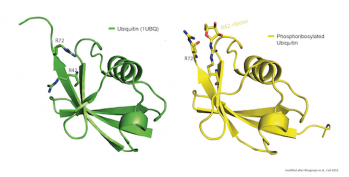News from the Institute

In the latest issue of Cell, a team around IBC2 director Ivan Dikic reveals molecular details of a novel ubiquitination mechanism that may affect numerous life processes.
Earlier this year, U.S. colleagues reported that Legionella enzyme SdeA is capable of catalysing ubiquitination single-handedly. Now, the Frankfurt scientists together with collaborators from the MPI for Biology of Ageing (Cologne) have elucidated the chemistry behind and discovered a hitherto unknown type of linkage between ubiquitin and target proteins.
... (read more)
Genomic instability is a hallmark of cancer and aging. Scientists at Goethe University Frankfurt now discovered the molecular cause for genetic instability in patients suffering from a rare segmental progeroid syndrome named Ruijs-Aalfs syndrome. The syndrome leads to premature aging and early onset liver cancer.
“Until now, it was unclear how these patients, carrying mutations in the metalloprotease SPRTN, succumb to the disease”, comments Ivan Dikic, director of the Institute of Biochemistry II.

Raman et al. demonstrate transient SUMO-dependent complex formation between the AAA ATPase MDN1 and PELP1 during 60S biogenesis. They show that SUMO conjugation to PELP1 recruits MDN1 to pre-60S particles, while reversal of this modification by SENP3 is needed for the release of both factors during mammalian pre-ribosome remodeling.
... (read more)
The SUMO Signaling Group of IBCII find that SUMO signaling in hypoxia is altered by inactivation of SUMO-specific isopeptidases. Using proteomic analysis, we define a subset of hypoxia-induced SUMO1 targets and propose that hypoxia-induced SUMOylation of the transcriptional co- repressor BHLHE40 contributes to metabolic reprogramming under these conditions.
... (read more)
From July 4th to 7th, 2016, leading experts in Ubiquitin and Autophagy research from around the world were brought together at Goethe University’s Medical Campus for the first Frankfurt Conference on Ubiquitin and Autophagy, jointly organized by the Cluster of Excellence Macromolecular Complexes, the DKTK site Frankfurt/Mainz, the LOEWE program Ub-Net and SFB 1177.
... (read more)